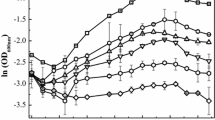Abstract.
Compared with exponential growing bacteria, carbohydrate-starved cells of Enterococcus faecalis exhibit a high level of resistance to sodium hypochlorite with maximal resistance observed in cultures entering stationary phase. Chloramphenicol treatment, at various stages of growing phase, does not abolish the hypochlorite resistance of starved cells. However, Enterococcus faecalis conditioned by low sodium hypochlorite concentrations does not develop tolerance towards a lethal dose of the disinfectant. Two-dimensional gel analysis shows that protein synthesis is drastically turned off by hypochlorite treatment, whereas synthesis of a few proteins is enhanced by a low concentration of this chemical agent.
Similar content being viewed by others
Author information
Authors and Affiliations
Additional information
Received: 5 September 1996 / Accepted: 29 October 1996
Rights and permissions
About this article
Cite this article
Laplace, JM., Thuault, M., Hartke, A. et al. Sodium Hypochlorite Stress in Enterococcus faecalis: Influence of Antecedent Growth Conditions and Induced Proteins . Curr Microbiol 34, 284–289 (1997). https://doi.org/10.1007/s002849900183
Issue Date:
DOI: https://doi.org/10.1007/s002849900183




